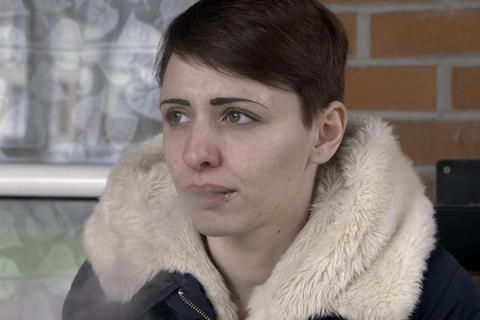An extraordinary, intimate first feature about one woman’s struggle to free herself from domestic abuse

Dir/scr: Clara Teper, Paul Pirritano. France. 2022. 72 mins.
In Lens, in northern France, a 23-year-old woman is taking the first steps towards freeing herself from an abusive relationship. Chaylla is the mother of a nearly-four-year-old son, Melvin, when we first meet her. Over the course of this extraordinary, intimate first feature, she reunites briefly with her partner and has a second son, Warren, before finally making decisive moves to claim back a future for herself and her two children. Chaylla’s face, with its gamine cropped hair and huge haunted eyes, exerts a magnetic pull on the camera; the uncomfortable truths of domestic violence and cycles of abuse play out in close-up shots which capture her courage and dignity as well as her shattered self-esteem. It is a wrenching and powerful work which speaks of a remarkable degree of mutual trust and respect between the subject and the filmmakers, achieved over a four year filming period.
What we take from the film is mainly a portrait of resilience and strength. It is also an account of female solidarity.
It is the first feature-length collaboration for Clara Teper and Paul Pirritano, although Teper previously directed a mid-length project about labour rights titled Tomorrow The Factory. They bring the kind of compassionate, humanistic approach to their filmmaking which should chime with both documentary audiences and those of directors such as the Dardenne brothers. A healthy festival career, connecting with a similar audience to that of the comparably sensitive and compelling Scheme Birds, by Ellen Fiske and Ellinor Hallin, is likely. And interest from documentary specialist distributors is not out of the question.
There is a dispassionate calmness in the way Chaylla describes her relationship with her partner, William, which belies the horror of the words. She is explaining to a legal counsel her reasons for seeking to separate her life from his. Her older son’s diagnosis with cystic fibrosis was, she says, a turning point. William’s drinking increased. He was hitting her on a daily basis, breaking her nose in one incident. Under pressure from her partner, she explained to the dubious hospital staff that a wardrobe had fallen on her while she was cleaning it. But perhaps almost as insidious and damaging as the physical abuse is the mental damage that William inflicts. Being told constantly that you are worthless and a bad mother takes its toll; sooner or later you start to believe it. “Unless you are a victim of domestic abuse, it’s hard to understand.” William seems to adhere closely to the abuser’s playbook of toxic behaviour – he uses the children as a weapon against Chaylla, he gaslights her continually. And when it seems that she has finally secured a degree of independence, he stalks her.
Chaylla’s poise and stoicism occasionally crumbles – the perceptive camera captures a chewed nail, a knee that shakes with nervous tension, eyes red from crying. But what we take from the film is mainly a portrait of resilience, strength and wit. It is also an account of female solidarity. Chaylla is supported throughout by her best friend Pauline, and her mother-in-law Babette. Both women are also survivors of domestic abuse, both are there to share the bleakest moments and also the highs. Chaylla and Pauline cling to each other and dance, first to a French version of ‘Total Eclipse Of The Heart’ in the shelter where they both temporarily live, and later in a disco, singing defiantly and united against the world and the men who tried to break them but failed.
Production company: Novanima Productions
Contact: distribution@novanima.com
Producer: Marc Faye
Cinematography: Paul Pirritano
Editing: Pascale Hannoyer
























